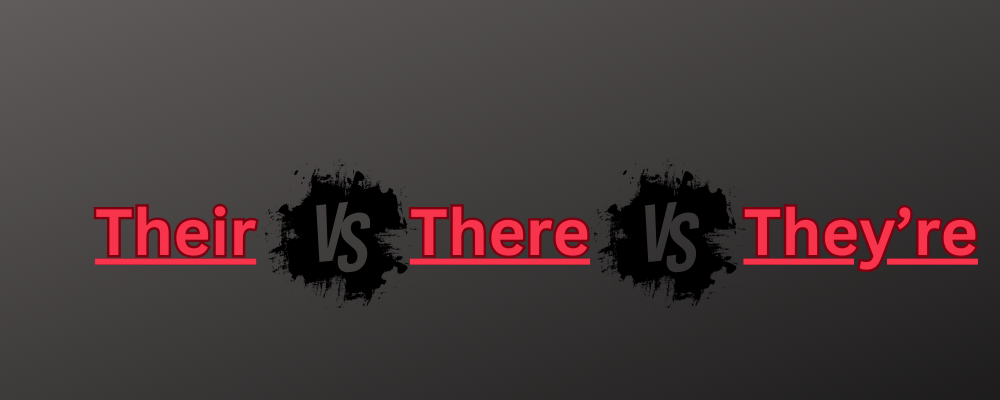When To Use Their Vs. There Vs. They’re – Grammar Guide

“Their,” “there,” and “they’re” are commonly mixed up words. It’s easy to mix up which one you should use in a given sentence when writing because they’re homophones. This means they sound the same when spoken but have different spellings and meanings. So, mixing them up can confuse readers and make your writing feel amateur. Worry not, though; today, I’ll be covering when to use “there,” when to use “there,” and when to use “they’re.”
- Their:
- You’ll use “their” when talking about things that belong to someone (e.g., “The pirates followed their treasure map”).
- There:
- You’ll use “there” when talking about a physical location (e.g., “The treasure is hidden there”) or figurative options (e.g., “There are many paths to success”).
- They’re:
- You’ll use “they’re” whenever you can replace it with “they are” and the sentence still makes sense (e.g., “They’re finally setting sail!”).
These three words are some of the most commonly mixed-up homophones and some of the most vexing for many readers. While the above description gives you a nice overview of each word, it’s meaning, and use, there is more to discuss on the topic. So, without further ado, let us dive deeper into “their,” “there,” and “they’re.”
Their Vs. There Vs. They’re – Grammar Guide

When To Use Their
“Their” is a possessive pronoun, similar to “my” or “her,” but specifically indicating ownership for one or more people.
Here are some of the different times you’d use “their”:
- Belongings: Use “their” when referring to things that are owned by someone. This can be anything from physical objects to more abstract concepts.
- Example: “The club members decorated their meeting space for the event.” (The meeting space belongs to the club members.)
- Relationships: “Their” can also indicate relationships or connections.
- Example: “The couple argued over their vacation plans.” (The vacation plans belong to both partners in the couple.)
- Shared Traits: “Their” can describe characteristics or qualities shared by a group.
- Example: “The students presented their research findings to the class.” (The research findings belong to all the students who worked on the project.)
Remember, “their” is always plural, even if it refers to a singular “you” in a formal setting.
- Example: “Their application for the scholarship is complete.” (Formal way to refer to someone’s application.)
You May Also Like: Effect vs. Affect: Learn the Difference Once And For All
When To Use There
“There” is an adverb used to indicate a place or position. This can refer to physical locations, figurative locations, or directions. Here are some examples of when and how to use there.
- Physical Location: Use “there” to point to a specific physical location.
- Example: “I have to work the night of the party, so I’m not going to be there.” (Points to a specific spot)
- Figurative Location: “There” can also be used for a figurative location, like an option or possibility.
- Example: “There are many factors to consider when choosing a career path.” (Refers to various options)
- Direction: You can also use “there” to indicate direction or movement.
- Example: “Please put the book back there when you’re finished with it.” (Points in a specific direction)
Remember: “There” can sometimes introduce a sentence, but it doesn’t necessarily need a subject.
- Example: “There you have it, the perfect recipe for chocolate chip cookies!” (Doesn’t have a specific subject)
When To Use They’re
They’re is a contraction or a shortened version of the words “they are.” Here is how and when you should consider using they’re in your writing:
- Contraction for “They Are”: Use “they’re” whenever it can be replaced with “they are” and the sentence still makes sense. This is the key trick to remember with “they’re.”
- Example: “They’re finally leaving for their trip tomorrow!” (Can be replaced with “They are” – “They are finally leaving for their trip tomorrow!”)
- Informal Writing: “They’re” is more commonly used in informal writing and conversation. In formal writing, it’s preferable to use the full two words “they are.”
Remember: “They’re” doesn’t show possession or location. It’s simply a shortcut for “they are.”
How To Remember The Difference Between Their, There, & There
Knowing the difference between the words is good but remembering the difference when writing is key. So, if you’re ever struggling to choose between “there,” “their,” and “they’re” you can use these tricks to keep you on track. Each word’s meaning or usage can be found in its spelling. Check these out:
- There: Think of “here.” “There” literally has “here” hidden within it! Just like “here” indicates location, so does “there.”
- Their: This one is all about ownership. Notice “heir” hiding inside “their”? Heirs inherit things, and “their” shows that something belongs to one or more people.
- They’re: See the apostrophe? It’s a contraction, a shortened version of two words. In this case, “they’re” is short for “they are.” If you can substitute “they are,” and the sentence still makes sense, you’ve got the right word.
Their, There, Or They’re Quiz
Confident You Know The Difference Now? Take Our “Their, There, They’re Quiz.” Simply follow the link, click on the a.), b.), or c.) to mark your answer, and then scroll down to the answer sheet to check your work when finished.